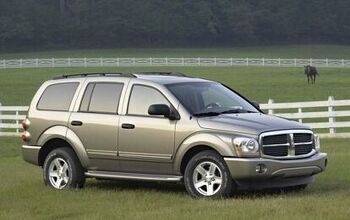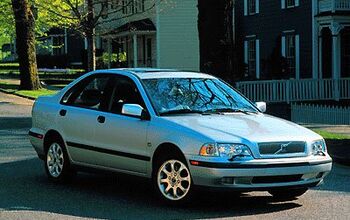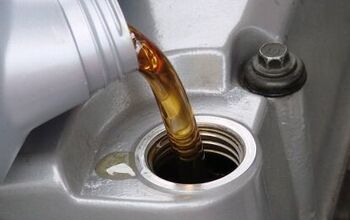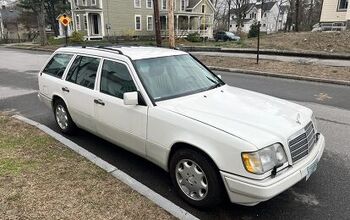Piston Slap: Wither Synthetic Oils?

TTAC Commentator Halftruth writes:
Sajeev,
I am in the market for a new mid size truck. I have been looking at Tacomas both new and used and came across a used one at a decent price. Thing is, the owner states that “purchased new and immediately changed all fluids to synthetic from the oil to the rear diff”.
I am not crazy about this as I have heard of nightmares from folks going to redline, purple stuff etc etc for a better (shift, mpg whatever). Why dont folks leave well enough alone? What is your take on this???
Sajeev answers:
Considering many vehicles run synthetic (motor) oil from the factory and even more run semi-synthetic stuff, I’m pretty much indifferent. Making the switch in the first few years of ownership isn’t gonna hurt anything, provided you use the right weight/type and there isn’t a huge warning from the manufacturer about deviations from the factory stuff. (Subaru, Ferrari, BMW have all done this in the past, IIRC.) Hell I switched to synthetic (engine) oil in my Mark VIII when I bought it at the ripe old age of 117,000 miles! Aside from one common gasket fail point, I had no problems.
So why not switch to a full synthetic for most vehicles? You gotta love your ride for the next 10-20 years, that’s why not. That said, I switched my Ford Ranger over to Mobil 1 after 6,000 miles…so I guess I’m in it for the long run, too.
Perhaps synthetic rear axle fluid is also better, but I’ve switched before and never noticed a difference. But, on an older vehicle, if you’re going in there for something else…might as well make the switch.
Transmissions? That’s where the shit gets real. The sheer number of fluid requirements for gearboxes (mostly automatics) is more than a little horrifying. You gotta be REAL careful here. Any aftermarket synthetic oil you choose had better be compatible with the factory fluid. So do your homework: like a Q&A session with an answer right from the horse’s mouth.
Send your queries to sajeev@thetruthaboutcars.com. Spare no details and ask for a speedy resolution if you’re in a hurry…but be realistic, and use your make/model specific forums instead of TTAC for more timely advice.

More by Sajeev Mehta
Latest Car Reviews
Read moreLatest Product Reviews
Read moreRecent Comments
- FreedMike I don't think they work very well, so yeah...I'm afraid of them.
- ChristianWimmer I have two problems with autonomous cars.One, I LOVE and ENJOY DRIVING. It’s a fun and pleasurable experience for me. I want to drive my cars, not be driven by them.Two, if autonomous cars have been engineered to a standard where they work 100% flawlessly and don’t cause accidents, then freedom-hating governments like the POS European Union or totally idiotic current German government can literally make laws which ban private car ownership in their quest to save the world from climate change bla bla bla…
- SCE to AUX Everything in me says 'no', but the price is tempting, and it's only 2 hours from me.I guess 123k miles in 18 years does qualify as 'low miles'.
- Dwford Will we ever actually have autonomous vehicles? Right now we have limited consumer grade systems that require constant human attention, or we have commercial grade systems that still rely on remote operators and teams of chase vehicles. Aside from Tesla's FSD, all these systems work only in certain cities or highway routes. A common problem still remains: the system's ability to see and react correctly to obstacles. Until that is solved, count me out. Yes, I could also react incorrectly, but at least the is me taking my fate into my own hands, instead of me screaming in terror as the autonomous vehicles rams me into a parked semi
- Sayahh I do not know how my car will respond to the trolley problem, but I will be held liable whatever it chooses to do or not do. When technology has reached Star Trek's Data's level of intelligence, I will trust it, so long as it has a moral/ethic/empathy chip/subroutine; I would not trust his brother Lore driving/controlling my car. Until then, I will drive it myself until I no longer can, at which time I will call a friend, a cab or a ride-share service.


































Comments
Join the conversation
I've used Mobil 1 for over 30 years, changing it twice a year. The only one of my engines that I was able to look at was my '93 Grand Cherokee's 4.0, and it was amazingly clean with 70K on it. The valve cover gasket cracked or split and had to be replaced when it started trickling oil out the back end of the cover. I saw a friend's 2001 GMC 5.3's innards when he put a cam in it, and it was amazingly clean with over 150K on it. The cross hatch marks were still on all the bores, and everything looked to be in spec, so a new timing chain, valve springs, and water pump were put on and off it went. I don't think the cam change was worth it, but he's happy with how it runs.
on a slightly different subject, what a about oil changes for a car that doesn't rack up the miles very quickly, say 4-5k mi/yr. Do you change every six months? every year? Does conventional vs synthetic make a big difference in this case?